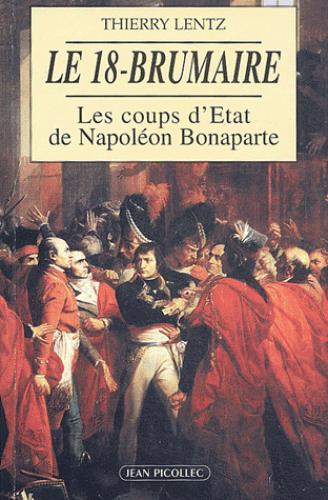History Prizes 1997
 FIRST EMPIRE PRIZE
FIRST EMPIRE PRIZE
Thierry LENTZ, Le 18-Brumaire, Les coups d’État de Napoléon Bonaparte, Paris, Éditions Jean Picollec
The 18th and 19th Brumaire in year VIII (9th and 10th November 1799), Bonaparte and Sieyès together took control, after a coup d’État which Tocqueville considered as ‘one of the worst planned imaginable’. Six weeks later Bonaparte was the sole head of the executive of a new regime and boasted that the Revolution was over. On his return from the Egyptian campaign (16th October) he only needed three months to assume full power.
How was it possible for such an operation succeed, and why? Did the Directoire’s opposition make the coups d’État inevitable and really necessary? What respective roles did Sieyès et de Bonaparte play, how much were they hand in glove – financial matters included – and how much did they benefit? How did Bonaparte manage to get rid of Sieyès, who had prepared everything and who thought himself at last catapulted to leadership of the Republic ?
Far from being almost bungled, was not the coup d’État in the words of Malaparte ‘the first modern coup d’État’? These are all the issues which Thierry Lentz addresses in this work, prefaced by Jacques Jourquin.
Thierry Lentz, director of the Fondation Napoléon, has published several works on the Napoleonic period: La Moselle et Napoléon (1986), Roederer (1990), Savary, le séide de Napoléon (1993) in the Éditions de la Serpenoise. He is also author of Kennedy, enquiry into the assassination of a president (Jean Picollec, 1995) and Napoléon III published in the collection Que sais-je ? (1995). He writes regularly for several historical periodicals and
recently won the Perret de l’Institut prize (Académie des Sciences Morales et Politiques) for his biography of de Savary, second minister of Napoleon’s Police.
 SECOND EMPIRE PRIZE
SECOND EMPIRE PRIZE
François CARON, Histoire des chemins de fer en France, 1740-1883, Paris, Éditions Fayard
The changes wrought by the invention of steam locomotion were more far-reaching than is generally recognised. It is still necessary to go over the ground one more time in minute detail, from the invention and its developments, to its impact on the people (mobility, expansion, and migration of the population), the way it was financed and its economic effects, the establishment of rail unions etc.
In a book which is the concentration of several decades of first-hand research, François Caron gives us an exhaustive account of France’s entry into the modern era. Destined to become a classic, this book is volume one of a trilogy which aims to recount the history of the railways in the modernisation of France.
François Caron, lecturer at the University of Paris IV-Sorbonne, is one of the best French economic historians. With this three-volume Histoire des chemins de fer en France, 1740-1883, he returns to one of his specialist fields, in that his thèse d’État was on the Compagnie des chemins de fer du Nord (1973). He was also author of volume V of the History of France edited by Jean Favier.
